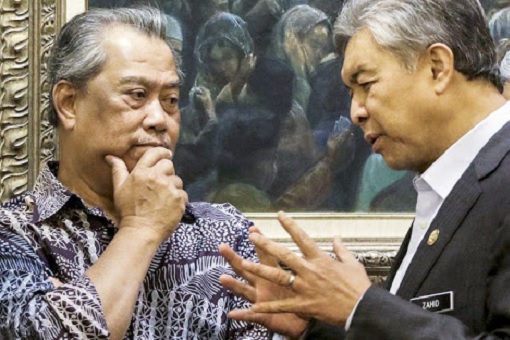In Malaysia’s political ring fight, Zahid may find himself knocked out

Muhyiddin Yassin is keeping his friends close and his frenemies closer, while Zahid Hamidi has nifty moves of his own but will he prevail, asks a researcher.
By Francis E Hutchinson, CNA
SINGAPORE: Talk about fiddling when Rome burns. Thursday was a dark day for Malaysia, as the country recorded more than 8,800 new COVID-19 cases — the second-highest since the pandemic outbreak.
Yet, attention focused on the latest scuffle between leaders of its Malay-based parties. At first blush, Prime Minister Muhyiddin Yassin and his Perikatan Nasional (PN) administration are looking weary and embattled.
Prodded by the King’s call to allow Parliament to resume, the PM’s office declared on Monday (Jul 5) that the Lower House would sit for five days and the Upper House for three at the end of July and early August. The statement’s wording and short timeline prompted opposition leaders to ask if the sitting would consist of briefings rather than debates.
Two days later (Jul 7), Muhyiddin was caught cold by another punch. Zahid Hamidi, the president of the United Malays National Organisation (UMNO), declared that his party would no longer support the prime minister.
Despite PN’s contested majority in the Lower House, Muhyiddin’s administration is not in immediate danger. The lack of a unified opposition commanding a convincing majority as well as the role of the Parliamentary Speaker, Azhar Harun, in prioritising government business will preclude any motion of no-confidence making it to the floor.
Nonetheless, Muhyiddin is not taking any chances with his mercurial coalition partner, the United Malays National Organisation (UMNO). Keeping his friends close and his frenemies closer, he moved to co-opt two key figures from that party.
Just before Zahid’s bombshell on Wednesday, the Prime Minister named Ismail Sabri Yaakob, Senior Minister for Security and Defence and UMNO Vice President, as Deputy Prime Minister.
In addition, Hishammuddin Hussein, Minister of Foreign Affairs and UMNO political blueblood was made Senior Minister and given Ismail’s former security portfolio.
This marks an important shift in the balance of power forged when Perikatan Nasional came to power in March 2020.
At that point, Muhyiddin broke with tradition in not naming a Deputy Prime Minister. He opted to create four Indonesian-style Senior Minister positions – of which two were allocated to members of his own party, Parti Pribumi Bersatu Malaysia, and only one to UMNO.
This unique structure obviated any clear threat to his office from within the administration.
There are several reasons for the latest recalibration.
First, while 74 is not particularly old for a prime minister by Malaysian standards, Muhyiddin has had health issues. He had a bout with pancreatic cancer in 2018, and rumours of his ill-health increased following a recent sojourn in hospital. Clearly, nominating a deputy lays the ground for longer medical leave should it be necessary.
At a strategic level, these two changes can help defuse tensions between Muhyiddin’s Bersatu party and UMNO. The latter party received a smaller share of cabinet portfolios compared to the former, despite having 38 MPs versus Bersatu’s 30 parliamentarians. Long used to being the dominant player, UMNO then compiled a litany of complaints.
The promotions are thus to apply balm to raw wounds. Furthermore, the months ahead will be difficult for PN, and a more equal footing with UMNO will prevent it from claiming it has a fresh approach to the country’s challenges.
The promotions also constitute a veiled strike at Zahid. Facing 87 charges for corruption and associated offences, the suave political operative has his own worries. Together with other senior party leaders facing legal woes, Zahid has been vocal in highlighting PN’s shortcomings.
Muhyiddin, in promoting Ismail Sabri and Hishammuddin, is in effect strengthening alternative centres of power to Zahid in UMNO.
ZAHID’S NIFTY MOVES
Zahid has shown some nifty moves of his own. Leveraging on his support base in the Supreme Council, the party’s apex decision-making body, UMNO delayed its internal elections.
Originally slated for June, the polls have been delayed by up to 18 months. Allegedly due to pandemic-related restrictions on gathering and voting, the postponed exercise precludes aspiring rivals from getting ideas.
In turn, Zahid’s counter-punch on Wednesday was in response to Ismail and Hishammuddin’s promotions. Following a four-hour Supreme Council meeting that day, the UMNO President called on the Prime Minister to step aside in favour of an interim leader.
Zahid listed a litany of “government failures” in its COVID-19 response, economic policies, and the suspension of Parliament. He added that elections should be held once herd immunity has been achieved.
While the riposte was to be expected, the UMNO President’s latest attack may contribute to his undoing.
The Agong has called on Malaysia’s political leaders to focus on the pandemic and, if UMNO itself is unable to hold elections, it is not clear how the country can successfully hold polls in the near future.
Furthermore, UMNO is not at all distant from PN’s COVID-19 fight. The Health Minister, Adham Baba, and the National Coordinating Minister for Immunisation, Khairy Jamaluddin, are both UMNO MPs.
At the deepest level, however, Zahid’s key challenge lies in his corner of the ring. While he has allies in the party hierarchy, the vast majority of UMNO MPs are doing quite well in the current administration.
Of the party’s 38 MPs, some three quarters have ministerial, deputy ministerial, or senior government-linked corporation (GLC) positions. It is not clear how Zahid, given his waning political fortunes and legal woes, will be able to match this.
Threats are often more effective when they are not acted upon, and his riposte may well deepen schisms in the party. If UMNO’s parliamentarians do not throw their hats into the ring, Zahid may find himself all punched out in the corner.
Francis E Hutchinson is a Senior Fellow and coordinator of the Malaysia Studies Programme at the ISEAS – Yusof Ishak Institute. This article was first published as a commentary on Fulcrum.

